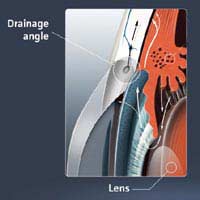What is Glaucoma?

Glaucoma is one of the most common eye conditions and affects around 2 per cent of people aged over 40 years. There are over 500,000 people in England and Wales with the condition. However it can be easily treated and managed if caught early enough. Early detection is crucial to minimise any potential sight loss. In many cases good vision can be preserved and any loss in vision can be slowed down.
There are 4 main types of glaucoma - the most widespread is chronic glaucoma. All types of glaucoma occur as a result of damage to the optic nerve which is caused by raised pressure in the eye. Pressure rises in the eye when the liquid produced by a layer of cells behind the iris cannot drain away properly or if too much liquid is produced. When the pressure increases it places a strain on the optic nerve, causing damage.
Acute glaucoma occurs suddenly when there is a complete blockage of the fluid and this can cause permanent damage to the optic nerve if it is left untreated. This type of glaucoma is not very common in western countries.
Other types of glaucoma include secondary glaucoma which occurs when the rise in pressure in the eye is due to another eye condition. Developmental or congenital glaucoma is also rare. This condition affects some babies and is caused by malformation in the eye.
Symptoms
Many people will not experience any symptoms and their sight may seem perfectly normal. This is why it is important to have regular eye tests to check for glaucoma, especially as you get older. Some people find that their vision in one eye starts to deteriorate. As the glaucoma worsens their centre of vision is the last to be affected resulting in so-called tunnel-vision. Acute glaucoma, when the fluid in the eye becomes completely blocked, can be painful as an attack comes on very quickly. There may also be nausea and vomiting.Treatments
Treatments are effective when the condition has been caught in the early stages. All treatments reduce the pressure in the eye and can consist of eye drops, tablets, laser treatment or surgery. For chronic glaucoma eye drops are usually prescribed to reduce the amount of liquid in the eye and improve drainage. It is imperative that patients continue to use the eye drops even if their vision seems good. A patient's sight may appear normal but it could be getting worse without them noticing. Acute glaucoma needs immediate treatment in a hospital. Drugs will be given to reduce the pain and pressure. Laser treatment or minor surgery will be needed but is not painful. The ophthalmologist may advise treatment in the other eye to prevent the condition developing in both eyes.Risks
The risk of developing glaucoma increases with age. 5% of people aged over 65 years have glaucoma. The condition can affect babies and younger people but this is rare. Some groups of people are more at risk than others. Those from African-Caribbean origin or those who have a high level of short-sightedness are more at risk. Some studies have shown that people with diabetes are also more likely to develop glaucoma.Early detection is vital to limit and control the disease. Everyone should have regular eye tests every two years but if you are in one of the risk groups, it is even more important to have regular checks. If you have a close family member aged over 40 with the condition, that is a mother, father, sister or brother, you are entitled to a free NHS eye test every year.
- What is Allergic Conjunctivitis
- What Does Uveitis Mean?
- What is Retinal Vein Occlusion, RVO
- My Lazy Eye Got Me Bulllied at School
- Iritis Explained
- Squint Repair
- Amblyopia or Lazy Eye
- Blepharitis
- Chalazion or Lump on Eyelid
- Styes
- What is Age Related Macular Degeneration?
- Treating Cataracts
- Short Sightedness
- Treating Age Related Macular Degeneration
- Diabetic Retinopathy
- Long Sightedness
- Astigmatism
- What are Cataracts?
- Detached Retina
- Treating Glaucoma


Re: What is Vitrectomy Surgery?
I had vitrectomy 4 weeks ago. The surgery was not well done as apparently bleeding occurred. The hole did not close despite having…
Re: Glasses or Contacts?
I need a eye exam and new glasses it's been since 2013/ I have no income I lost my boyfriend last September and I've been homeless ever…
Re: Eyewear for the Partially Sighted
This extract from your text is not clear and the grammar is poor- and the letters in the validation box are mixed…
Re: Eye Cancer Symptoms
I have yellow in both eyes lools like 2 dots. But looks like its makin the white part of my eye yellow whats wrong with me
Re: Are my Glasses Affecting my Eyes?
Hi, Please can anyone give advice on wearing varifocals. After a short while I develop a severe ache in my left eye and…
Re: Are my Glasses Affecting my Eyes?
On wearing my new varifocals, I am finding that my left eyeball hurts so much it feels like it will explode after 15…
Re: What is the Cause of my Itchy Eye?
I have One and only One itchy eye that has been going on 24/7 for 5 weeks.Eye is not swollen vision not affected. Eye doc…
Re: Contact Lens Trials Explained
Hi, We wanted to get in touch with you to increase traffic on your website. Please reply to this email so we can send you free…
Re: What Are Photoreceptors?
I have a 10 year old grandson who was diagnosed at apx 2 with cone and rod dystrophy eye disease. Please help with any treatment…
Re: Driving and Eyesight
Danny6520 - Your Question:Hi,I am only 16, but soon I will be 17and I am hoping to drive. However I have a few problems. Firstly, I am…